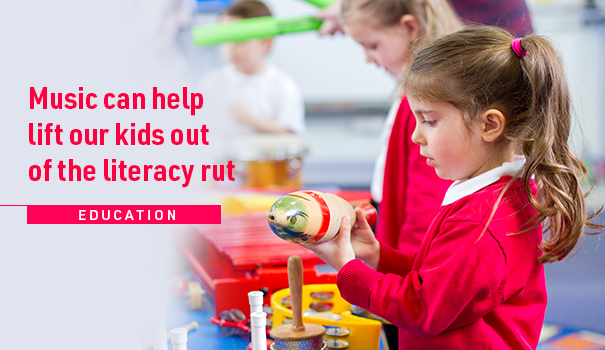Music can help lift our kids out of the literacy rut

But schools in some states are still missing out
The 2005 National Review of School Music Education found that successive re-structuring within education systems has led to a reduction in music-dedicated services located either centrally or in districts/regions. With one or two exceptions, relatively little work has been done to provide Internet, mentoring and networking services to support music in schools.
Support for instrumental and vocal music is provided centrally for government schools in four of the States and Territories: Northern Territory, Queensland, South Australia and Western Australia. These services include low cost instrument hire schemes and music libraries.
In the other States and in the independent schools sector, instrumental and vocal tuition is most often provided at an individual school level and on a user pays basis.
This again highlights that those who play music are those who can pay for music.
Dywer and Collins, published on theconversation.com, now have evidence that we should be concerned about music education not just for the sake of music itself, but also because of its impacts on language learning and literacy. Research about how participating in music affects the brain – a field known as neuromusical research – has taught us a lot about how the brain processes language. Significantly, it processes language in the same way as music.
If we want to improve literacy, then, we need to ensure the cognitive foundations our students need are in place.
In short, we need to view music education as a powerful complementary learning experience, and not a “nice but not essential” part of the curriculum.
This video explains how playing an instrument benefits the brain:
Music and literacy progress
Despite the focus on literacy learning in the last 5 years there has been no significant boost to NAPLAN results.
Who teaches the music?
The provision of music education in Australia varies state to state, with different models and programs offered in each jurisdiction. In schools where it is prioritised, music is recognised as part of the core curriculum.
For the music teacher, there often exists the situation where a teaching load becomes an overload with the addition of after school rehearsals and performance times. Teachers may also carry an administration load for the running of a department. Behind any successful music department are many very dedicated staff who are willing to put in many extra hours for the benefit of music education.
Might we then look to research outside the literacy field for the next steps in improving literacy in our schools?
The answer is yes. A field traditionally a few steps outside of literacy education – music education – has greatly enhanced understanding of how the brain develops understanding and application of language.
Put simply, if a child cannot hear the language sound – that is, process the sound correctly through their auditory network – they cannot speak it. And if they cannot speak it, they cannot read it.
When it comes to education, politicians and policymakers ignoring the research evidence is hardly new. But the failure to see the bigger picture of every child’s development has lasting impacts.
The focus of education should be to provide the cognitive preparation for a full and productive life. And music is an integral part of providing students with the best possible foundation for their education.
Read the full article online: https://theconversation.com/music-can-help-lift-our-kids-out-of-the-literacy-rut-but-schools-in-some-states-are-still-missing-out-173908
Authors: Rachael Dwyer, Lecturer in Arts and Teacher Education, University of the Sunshine Coast; and Anita Collins, Adjunct assistant professor, University of Canberra.
Additional Sources
https://researchrepository.murdoch.edu.au/id/eprint/9459/1/music_review_reportFINAL.pdf
https://musicaustralia.org.au/discover/music-education/music-education-in-australia/

